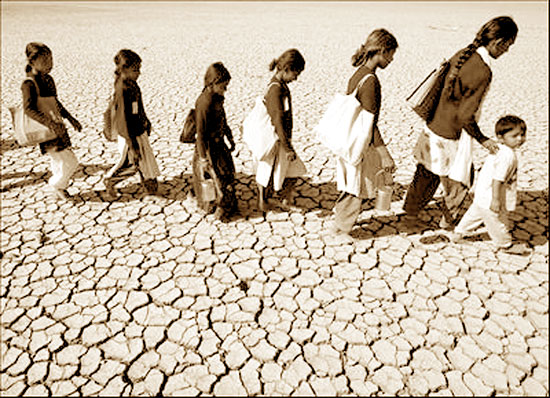|
World Population Day falls on July 11:
Tackling increase in population the need of the hour
By Rosanne Koelmeyer Anderson
[email protected]
Sri Lanka’s estimated population as at 2007 stands at 20.1 m from an
18.7 m in 2001. An increased growth rate of 1.1 has been recorded in
2006 and Sri Lanka has been identified as a country with an increasing
population.
 Although the crude birth rate from 28.2 in 1981 had steadily
decreased to 21.7 in 1991 to 18.5 in 2004, Sri Lanka’s ageing population
has shown a significant increase and this could soon become a great
challenge in the coming decades with vast economic, social and other
consequences says Deputy Director, Census Division, Department of Census
and Statistics, H.R. Dias. Although the crude birth rate from 28.2 in 1981 had steadily
decreased to 21.7 in 1991 to 18.5 in 2004, Sri Lanka’s ageing population
has shown a significant increase and this could soon become a great
challenge in the coming decades with vast economic, social and other
consequences says Deputy Director, Census Division, Department of Census
and Statistics, H.R. Dias.
Statistics reveal that the proportion of persons aged 60 years and
over in the world will double between 2000 and 2050 from 10 per cent to
21 per cent while 52 per cent of the world’s older population is said to
live in the Asia and the Pacific which makes this region the fastest
ageing region in the world.
Meanwhile, the Population Division, Department of Economic and Social
Affairs, United Nations Secretariat says that as the tempo of ageing in
developing countries is more rapid than the developed countries,
developing countries will have less time to adapt to the consequences of
an ageing population.
This current demographic revolution is predicted to continue for a
long period of time. It states that one out of every ten persons is now
60 years or above: by 2050, one out of five will be 60 years or older
and by 2150 one out of three persons will be 60 years or older. The
older population is ageing.
The oldest old (80 years or older) is the fastest growing segment of
the older population and they make up 13 per cent of the 60+ age group
and will grow to 20 per cent by 2050. The number of centenarians (aged
100 years or older) is projected to increase 14 fold from approximately
265,000 in 2005 to 3.7 m by 2050 with fifty five per cent of them being
women.
Meanwhile, between 2005 and 2050 the old-age dependency ratio is also
expected to almost double in more developed regions and triple in the
less developed regions making the potential socio-economic impact on
society that may result from an increasing old-age dependency ratio an
area of growing research and debate.
It is said that another contributory factor towards an ageing
population is the increase in life expectancy due to advances in
medical technology, improved access to quality reproductive health
services, wider vaccination coverage, improved hygiene and nutrition
standards as well as increased access to safe water.
Interestingly, the reality of this situation was also pointed out by
eminent space visionary Sir Arthur C. Clarke who in an article written
by him titled My vision for Sri Lanka in 2048 which appeared in the
Daily News of March 22 this year candidly expressed his views.
 An excerpt of the article states as follows: During my 40 years of
association with the island, the human population has almost doubled and
managing this expansion will continue to be one of Sri Lanka’s
formidable challenges. An excerpt of the article states as follows: During my 40 years of
association with the island, the human population has almost doubled and
managing this expansion will continue to be one of Sri Lanka’s
formidable challenges.
It might be argued that a country so rich in natural resources could
support a large population and to much higher standards of living, but
the rate of increase in the past fifty years has been so rapid that it
did not allow time for necessary planning and infrastructure.
Fortunately, sound pollution policies have now helped Sri Lanka
achieve moderate rates of growth, but absolute numbers will continue to
grow for decades before stabilizing. It has been said that the biggest
remaining challenge in terms of human health and welfare is not so much
to add years to life, but to add life to years.
A notable and profound thought. The reality is how far could we
stretch our resources which would mean a greater burden on the
government and poverty; a vital question each of us ought to ask
ourselves, for the answer lies within us and each family unit.
In such a scenario, the question which would appropriately arise is
Should there be law enforcement to curtail the maximum number of
children to two per family. China and Singapore after all wisely adopted
the one child policy and it worked out well for them.
However, substantial effort is being exercised by the Family Health
Bureau of Sri Lanka and the Family Planning Association (FPA) of Sri
Lanka to keep the figures down and reduce unwanted pregnancies.
The prevalence rate of family planning is currently 71-72 per cent,
Dr S.R. Willatgamuwa, Director Medical(FPA) states. Sales of
contraceptives have increased while the government too is also
conducting many on going outreach programs, lectures and workshops to
curb unwanted pregnancies where the MOH officers are directly involved.
Last year, a Service Delivery Point (SDP) was opened with project
managers operating around the country while 350 trained volunteers are
sent into the rural sector, Anuradhapura, Matara, Kandy and Kurunegala,
Batticaloa, Trincomalee, Koggala and Biyagama to find out if
contraception is successful or not, Dr. Willatgamuwa added.
 On the other hand the government healthcare workers too have been
detailed to take the Depo Provera injection which is said to be the most
popular method three monthly method of contraception to village level
while other methods like the Intra Uterine Device ( IUD) which last ten
years without having to bother, the contraceptive pills and the use of
condoms are also being encouraged and are in widely used statistics
reveal. On the other hand the government healthcare workers too have been
detailed to take the Depo Provera injection which is said to be the most
popular method three monthly method of contraception to village level
while other methods like the Intra Uterine Device ( IUD) which last ten
years without having to bother, the contraceptive pills and the use of
condoms are also being encouraged and are in widely used statistics
reveal.
However, the vital question arises as to how many people, especially
in the rural areas actually have sufficient knowledge on how to use
these methods successfully for their well being.
It still seems that much awareness about the absolute necessity to
control population explosion needs to be addressed more intensely is the
need of the hour in order to prevent unwanted pregnancies and probable
syndrome which may strike as a last warning cannibalism here we come if
we are seriously thinking in terms of reversing the situation and
enhancing the lives of our society: for knowledge or awareness will help
ensure a better tomorrow.
Meanwhile, the United Nations Statistics Division in collaboration
with the Department Census and Statistics of Sri Lanka is organizing a
Workshop on the Organization of National Statistical Systems and
User-Producer Relations which will take place at Hotel Hilton Colombo
from July 21 to 24.
This workshop will bring together senior statisticians and government
officials from South Asian countries.
Resource personnel from the United Nations and other international
and regional organizations will provide their expertise on the issues.
In addition to the workshop, there will be a consultative session with
other development partners. |
